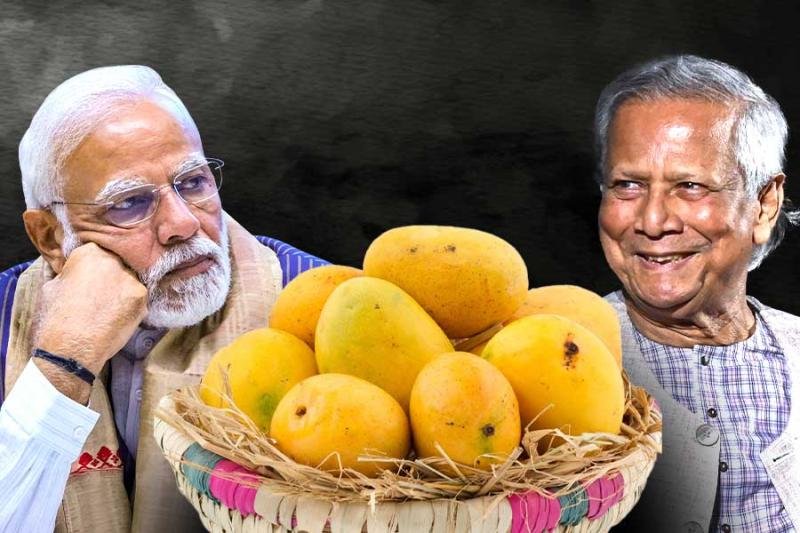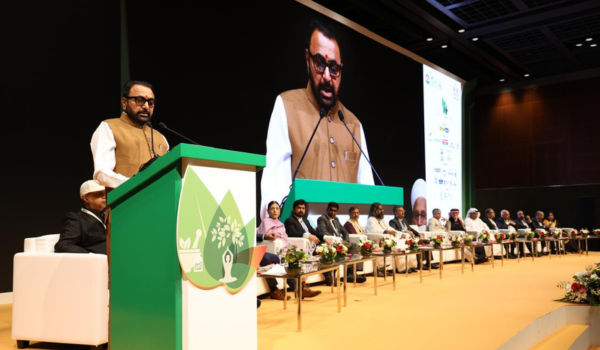
Last Updated on July 15, 2025 10:00 am by BIZNAMA NEWS
Zakir Hossain / Dhaka
In a symbolic gesture aimed at thawing the frosty diplomatic climate between New Delhi and Dhaka, Bangladesh’s interim Chief Adviser Muhammad Yunus has sent 1,000 kg of Haribhanga mangoes to Indian Prime Minister Narendra Modi. While mango diplomacy has long been part of the subcontinent’s diplomatic tradition, the move comes amidst rising tensions following the ouster of Prime Minister Sheikh Hasina in August 2024.
The gift, reminiscent of previous Bangladesh-India goodwill exchanges, includes consignments to West Bengal Chief Minister Mamata Banerjee and Tripura Chief Minister Manik Saha as well.
Haribhanga is a popular mango cultivar from northern Bangladesh, particularly Rangpur. Round in shape and fleshy in texture, each fruit typically weighs between 200 to 400 grams, with some reaching up to 700 grams. Notably, in 2021, Bangladesh sent 2,600 kg of Haribhanga mangoes to India through the Petrapole border, marking the high point of Sheikh Hasina’s mango diplomacy.
Following Hasina’s dramatic removal after a student-led mass uprising in 2024, Dhaka plunged into political instability. The event created a political vacuum and ushered in an interim government led by Yunus. With Hasina now in refuge in India and Bangladesh’s International Crimes Tribunal seeking her extradition, relations between the two nations soured. New Delhi expressed concern over the rise of extremist forces and increasing violence against religious minorities under the new dispensation.
Initially critical of India, Yunus made a notable pivot in March this year, telling a British media outlet that “there is no way Bangladesh-India relations cannot be good.” He emphasized the two nations’ shared history and economic interdependence, asserting, “Our relations are close… we cannot deviate from that.”
The first official meeting between Modi and Yunus took place in April on the sidelines of the BIMSTEC Summit in Bangkok. There, Modi reaffirmed India’s commitment to a “democratic, stable, peaceful, progressive and inclusive Bangladesh,” while voicing concerns over the treatment of minorities and urging a return to parliamentary democracy.
While Yunus had previously delayed national elections citing ongoing reforms, he recently announced that Bangladesh’s next general elections will be held in the first half of April 2026. In the meantime, a new political force—the student-led National Citizen Party (NCP)—has emerged, adding further complexity to the country’s fractured political scene.
Bangladesh’s previous governments, especially Hasina’s, maintained close ties with India and frequently used gifts like mangoes and hilsa fish to nurture bilateral goodwill. However, under Yunus, the interim regime briefly tilted toward Beijing and Islamabad, prompting anxiety in New Delhi. China’s growing presence in South Asia through loans, arms deals, and infrastructure investments has deepened Indian concerns over regional influence.
In this context, Yunus’ mango gesture could be read as a soft reset in bilateral ties. Whether the “sweetness” of mango diplomacy can offset deeper strategic disagreements remains to be seen. As one analyst quipped: “Can sweetness succeed where strategy fails?”






